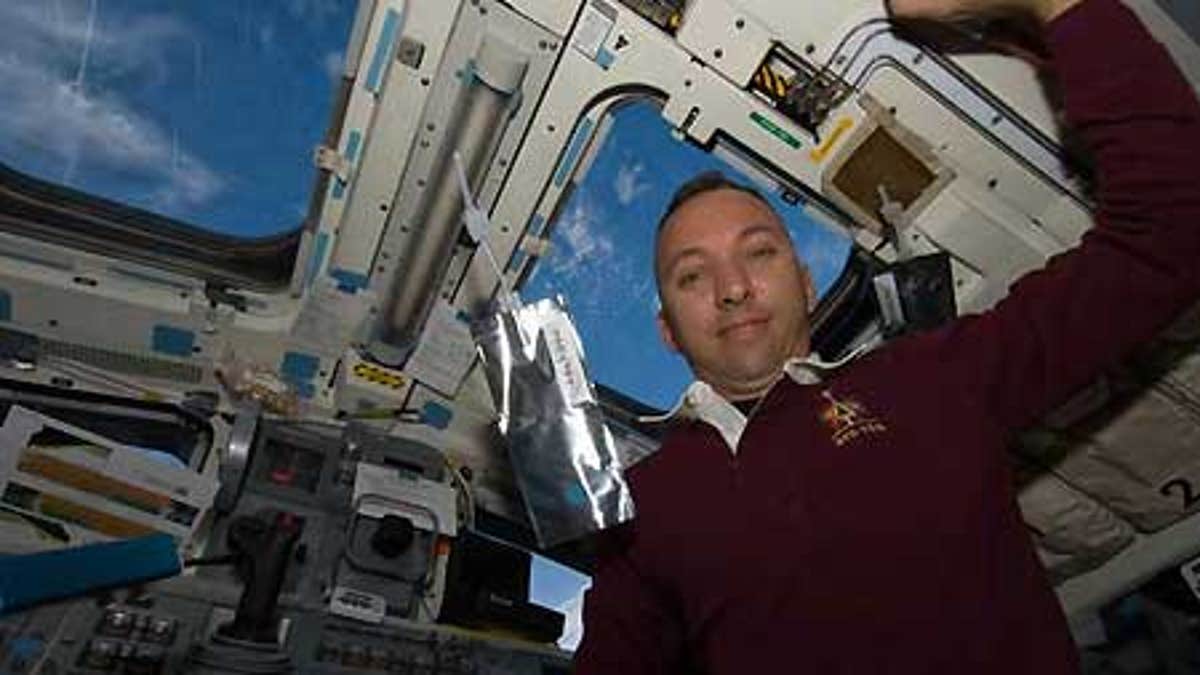
It may be the mother lode of all bad timing: Atlantis shuttle astronaut Randy Bresnik is stuck at the International Space Station, hundreds of miles from his pregnant wife Rebecca, who is expected to give birth to a baby girl as early as today.
Bresnik and his crewmates will spend their Friday hauling cargo between Atlantis and the space station, but NASA has set aside some time for the 42-year-old astronaut to call his wife for updates of his second child's arrival, mission managers said.
"I think like most parents, I would prefer to be there for the birth," Bresnik said during a NASA interview with his wife. "But you know, we don't pick this timing and so it's to be a bit disappointing not to see her in person right when she enters the world."
• SLIDESHOW: Atlantis astronauts go for a spacewalk
• SLIDESHOW: Space Shuttle Atlantis mission in pictures
Bresnik, a Marine Corps lieutenant colonel from Santa Monica, Calif., is making his first spaceflight on Atlantis' trip to the International Space Station. Bresnik's wife works at NASA's Johnson Space Center and the couple has one adopted son Wyatt, who is 3 1/2 years old.
Bresnik is poised to make his first spacewalk on Saturday, so he and Rebecca worked hard to try and arrange their first daughter's birth around his schedule. Atlantis is delivering tons of spare parts to the space station and due to return home the day after Thanksgiving.
"I'm just working with my doctors and working with Randy's schedule to make sure that, if possible, that we can do it on the day where he's not out doing [a spacewalk] and maybe have a little more communication that day," Rebecca said before her husband launched into space on Monday.
A blessing, even in space
The birth of Bresnik's daughter is a welcome miracle for him and his wife, especially since they thought Rebecca could not have children, ABC News has reported. But just months after adopting Wyatt last year, they learned she was pregnant.
"We're fortunate enough to witness the miracle of adoption as well as the miracle of child birth all in one year," Bresnik said. "We're just amazingly blessed."
Bresnik's crewmates said early Friday that the expectant father — and indeed all 12 people living on the linked shuttle and space station — are excited for the baby's arrival. Shuttle pilot Barry "Butch" Wilmore said that Bresnik has managed to remain calm ahead of the baby's birth.
"There's been minimal bouncing, maybe a tad bit," Wilmore told CBS News via a video link. "He's excited about that, so are we. It's a great thing to share in this environment."
Bresnik, like all astronauts, is a professional and committed to the mission during his baby's arrival, Wilmore said.
Eleven of the astronauts aboard the shuttle and station have children, 10 of them are fathers. Astronaut Nicole Stott, mother of one son, is returning home next week after more than two months at the station. Wilmore said they do plan to celebrate.
"Probably no cigars, but maybe some chewing gum," Wilmore said. Smoking and flames are not allowed on the space station.
While Bresnik is in space, family members are with Rebecca to help her with the upcoming birth.
"We very much appreciate what everyone has offered to do with helping us through this," she said.
Dads in Space
Bresnik is only the second American astronaut to be in space when his wife is expected to give birth.
Astronaut Mike Fincke's second child — a baby girl named Tarali Paulina — was born while he was flying aboard the International Space Station in 2004. Fincke coached his wife through the delivery from space using a telephone connection.
Shuttle mission flight director Mike Sarafin said this week that Bresnik's daughter was due to be born as early as today, and NASA has taken steps to keep the expectant dad in the loop. A live communications link to the delivery room is possible, but depends on timing.
"We do have some time set aside for him to talk to his wife, as appropriate. We'll do what we need to make that happen," Sarafin said, adding that the calls would be private conferences. "We'll just keep our fingers crossed that everything goes well for them."
Bresnik said he does expect to be able to see videos and photos of the new baby soon after she is born. But he'll settle for good news, plain and simple.
"You know, anything we have is far more than most military families get when somebody's deployed and they're not there for the birth," Bresnik said. "So if I can get a simple radio call that she's entered the world safely and Rebecca's doing great — everything above me on that is gravy."
